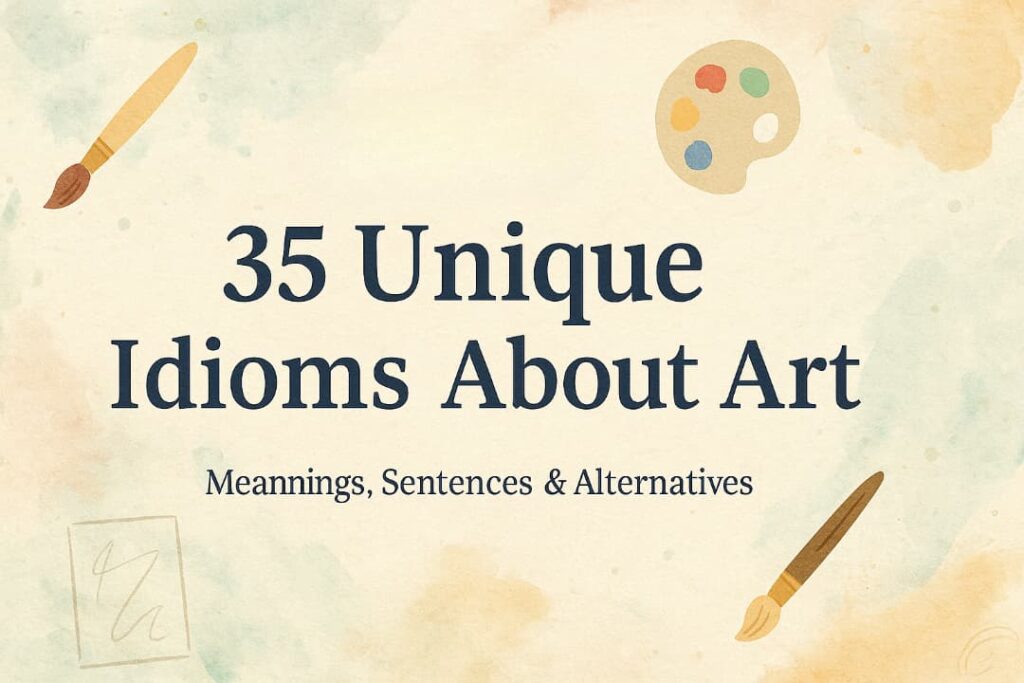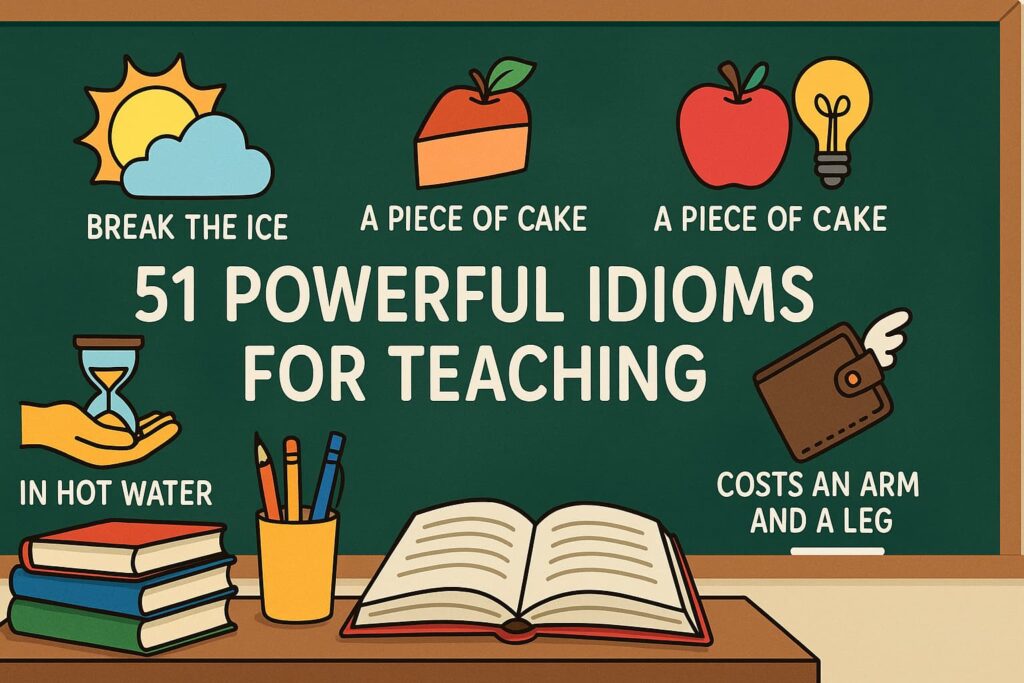Art idioms are a fascinating part of the English language that draw from the world of creativity, painting, and artistic expression. These idioms not only add color and depth to communication but also reflect cultural values around creativity, skill, and expression. This comprehensive guide explores 35 unique idioms related to art, offering detailed meanings, origins where relevant, practical examples, alternative phrases, and tips on how to use them effectively. Additionally, you will find a set of practice exercises to test your knowledge and improve retention.
Understanding Idioms About Art
Idioms are phrases whose meanings cannot be deduced from the literal meanings of the individual words. Art idioms specifically use metaphors and imagery related to painting, drawing, sculpture, and other creative processes. These expressions often highlight creativity, precision, control, or emotion, making them powerful tools for vivid communication.
35 Unique Idioms About Art with Detailed Explanations
- Right on the Money
Meaning: Exactly correct or accurate.
Origin: This phrase likely comes from gambling or financial transactions where being “on the money” means hitting the exact target or value.
In a Sentence: “Your color choice was right on the money for the gallery’s theme.”
Other Ways to Say: “Spot on,” “Exactly right.”
Usage Tip: Use this idiom to praise accuracy or precision in any context. - A Picture Paints a Thousand Words
Meaning: A single image can convey complex ideas or emotions better than words.
Origin: This proverb emphasizes the power of visual art to communicate.
In a Sentence: “The photograph of the devastated landscape painted a thousand words about the disaster.”
Other Ways to Say: “One image says it all,” “Pictures tell the story.”
Usage Tip: Use when emphasizing the impact of visual representation. - Break a Leg
Meaning: A way to wish someone good luck, especially before a performance.
Origin: Theatrical superstition where wishing “good luck” directly is considered bad luck.
In a Sentence: “Break a leg at your art show tonight!”
Other Ways to Say: “Good luck,” “Knock ’em dead.”
Usage Tip: Commonly used in performing arts but can be extended metaphorically. - Draw the Line
Meaning: To set a limit beyond which one will not go.
Origin: Possibly from drawing a literal line to mark a boundary.
In a Sentence: “I draw the line at plagiarizing someone else’s artwork.”
Other Ways to Say: “Set limits,” “Establish boundaries.”
Usage Tip: Useful for expressing personal or professional boundaries. - Paint the Town Red
Meaning: To celebrate exuberantly and often wildly.
Origin: Possibly from 19th-century England when revelers literally painted buildings red.
In a Sentence: “After winning the award, the artists painted the town red.”
Other Ways to Say: “Party hard,” “Celebrate wildly.”
Usage Tip: Use to describe festive, lively celebrations. - Color Outside the Lines
Meaning: To be unconventional or creative beyond accepted rules.
Origin: Refers to children’s coloring books where staying within lines is expected.
In a Sentence: “Her designs always color outside the lines, challenging norms.”
Other Ways to Say: “Think outside the box,” “Break the mold.”
Usage Tip: Encourages creativity and nonconformity. - Blank Canvas
Meaning: A fresh start or opportunity to create something new.
Origin: Literally an empty canvas waiting to be painted.
In a Sentence: “Starting college felt like a blank canvas for her future.”
Other Ways to Say: “Clean slate,” “Fresh beginning.”
Usage Tip: Use metaphorically for new opportunities. - Stroke of Genius
Meaning: A brilliant or inspired idea or action.
Origin: “Stroke” refers to a brushstroke in painting, symbolizing a creative act.
In a Sentence: “Using recycled materials was a stroke of genius.”
Other Ways to Say: “Masterstroke,” “Brilliant move.”
Usage Tip: Compliment innovative ideas or solutions. - Masterpiece
Meaning: An outstanding work of art or achievement.
Origin: Historically, a piece submitted by an apprentice to qualify as a master.
In a Sentence: “The sculpture is a true masterpiece of modern art.”
Other Ways to Say: “Work of art,” “Magnum opus.”
Usage Tip: Use for exceptional creations or accomplishments. - Paint a Picture
Meaning: To describe something vividly and in detail.
Origin: Metaphor for creating a mental image through words.
In a Sentence: “The author painted a picture of life in the 1800s.”
Other Ways to Say: “Describe vividly,” “Illustrate clearly.”
Usage Tip: Use to enhance storytelling or descriptions. - Art for Art’s Sake
Meaning: Creating art purely for beauty or expression, not for profit or utility.
Origin: A 19th-century aesthetic movement emphasizing pure art.
In a Sentence: “She creates paintings for art’s sake, not commercial gain.”
Other Ways to Say: “Pure art,” “Art without agenda.”
Usage Tip: Expresses dedication to artistic integrity. - Call the Shots
Meaning: To be in control or make important decisions.
Origin: Military or sports term for directing actions.
In a Sentence: “The director calls the shots on this project.”
Other Ways to Say: “Be in charge,” “Make the decisions.”
Usage Tip: Use to describe leadership or authority. - Brush Up On
Meaning: To improve or refresh a skill.
Origin: Refers to brushing paint or skills to improve them.
In a Sentence: “I need to brush up on my sketching before the class.”
Other Ways to Say: “Refresh knowledge,” “Practice again.”
Usage Tip: Use when revisiting or improving skills. - Draw Attention
Meaning: To attract notice or focus.
Origin: Art often draws viewers’ attention through composition.
In a Sentence: “The vibrant colors drew attention at the gallery.”
Other Ways to Say: “Catch the eye,” “Highlight.”
Usage Tip: Use for anything that attracts notice. - Picture-Perfect
Meaning: Flawless, ideal, or exactly right.
Origin: Describes an image so perfect it looks like a photograph.
In a Sentence: “Her performance was picture-perfect.”
Other Ways to Say: “Immaculate,” “Ideal.”
Usage Tip: Use to praise perfection. - Artistic License
Meaning: Freedom to alter facts or reality for artistic effect.
Origin: Artists often take liberties with reality in their work.
In a Sentence: “The filmmaker took artistic license with the historical events.”
Other Ways to Say: “Creative freedom,” “Poetic license.”
Usage Tip: Explains deviations from facts in art. - Paint a Rosy Picture
Meaning: To describe something more positively than it really is.
Origin: “Rosy” symbolizes optimism or beauty.
In a Sentence: “The report painted a rosy picture of the economy.”
Other Ways to Say: “Sugarcoat,” “Gloss over.”
Usage Tip: Use when someone is overly optimistic. - Paint a Grim Picture
Meaning: To describe something negatively or bleakly.
Origin: “Grim” conveys darkness or seriousness.
In a Sentence: “The forecast painted a grim picture of the future.”
Other Ways to Say: “Depict bleakly,” “Forecast badly.”
Usage Tip: Use to describe pessimistic views. - Carve Out a Niche
Meaning: To establish a specialized role or market.
Origin: “Carve” refers to shaping something carefully.
In a Sentence: “She carved out a niche as a digital artist.”
Other Ways to Say: “Find a specialty,” “Create a market.”
Usage Tip: Use when finding a unique position. - Like Watching Paint Dry
Meaning: Extremely boring or tedious.
Origin: Watching paint dry is famously dull.
In a Sentence: “The lecture was like watching paint dry.”
Other Ways to Say: “Boring as hell,” “Tedious.”
Usage Tip: Use to express boredom. - Draw Someone Out
Meaning: To encourage someone to speak or express themselves.
Origin: “Draw” as in pulling someone out of their shell.
In a Sentence: “The teacher drew the shy student out during class.”
Other Ways to Say: “Encourage openness,” “Bring out.”
Usage Tip: Use when helping someone open up. - Masterpiece in the Making
Meaning: Something developing into a great work or achievement.
Origin: Refers to a work not yet finished but promising.
In a Sentence: “Her first novel is a masterpiece in the making.”
Other Ways to Say: “Work in progress,” “Future classic.”
Usage Tip: Use to encourage or describe potential. - Put the Finishing Touches On
Meaning: To add final improvements or details.
Origin: Final brushstrokes complete a painting.
In a Sentence: “He put the finishing touches on his painting before the exhibition.”
Other Ways to Say: “Finalize,” “Complete.”
Usage Tip: Use when completing a task. - Paint Oneself into a Corner
Meaning: To create a difficult situation with no easy escape.
Origin: Literally painting a floor corner and trapping oneself.
In a Sentence: “He painted himself into a corner by promising too much.”
Other Ways to Say: “Trap oneself,” “Create a dilemma.”
Usage Tip: Use when someone limits their own options. - Off the Wall
Meaning: Eccentric, unusual, or unexpected.
Origin: Suggests ideas bouncing unpredictably.
In a Sentence: “Her off-the-wall ideas sparked a new trend.”
Other Ways to Say: “Unconventional,” “Eccentric.”
Usage Tip: Use for quirky or surprising ideas. - Still Life
Meaning: A static or inactive situation or scene.
Origin: A genre of painting depicting inanimate objects.
In a Sentence: “The office was like a still life on Monday morning.”
Other Ways to Say: “Static scene,” “Inactive setting.”
Usage Tip: Use metaphorically for inactivity. - Moving Picture
Meaning: A film or movie.
Origin: Early term for movies.
In a Sentence: “They watched a moving picture about famous painters.”
Other Ways to Say: “Film,” “Motion picture.”
Usage Tip: Use when referring to films. - The Writing Is on the Wall
Meaning: Clear signs that something bad will happen.
Origin: Biblical story of mysterious writing predicting doom.
In a Sentence: “The company’s decline was obvious; the writing was on the wall.”
Other Ways to Say: “Clear warning,” “Obvious sign.”
Usage Tip: Use when trouble is imminent. - Avant-Garde
Meaning: Innovative, experimental, or radical art or ideas.
Origin: French military term meaning “advance guard.”
In a Sentence: “The gallery featured avant-garde installations.”
Other Ways to Say: “Cutting edge,” “Progressive.”
Usage Tip: Use for pioneering or unconventional art. - Abstract
Meaning: Not concrete; conceptual or non-representational art.
Origin: Art that does not depict recognizable scenes.
In a Sentence: “His abstract paintings challenge traditional forms.”
Other Ways to Say: “Conceptual,” “Theoretical.”
Usage Tip: Use for non-literal art or ideas. - A Brush with Fame
Meaning: A brief experience of being famous or meeting a celebrity.
Origin: “Brush” as a light contact or encounter.
In a Sentence: “She had a brush with fame when her artwork was displayed in the museum.”
Other Ways to Say: “Moment of fame,” “Brief celebrity.”
Usage Tip: Use for fleeting fame experiences. - Frame of Mind
Meaning: A person’s mood or mental state.
Origin: “Frame” as a structure holding a picture, metaphor for mindset.
In a Sentence: “He wasn’t in the right frame of mind to create art.”
Other Ways to Say: “Mood,” “Mental state.”
Usage Tip: Use to describe feelings or attitudes. - Sketchy Situation
Meaning: A suspicious or questionable circumstance.
Origin: “Sketchy” originally meant roughly drawn or incomplete.
In a Sentence: “That deal sounds like a sketchy situation.”
Other Ways to Say: “Dodgy,” “Suspicious.”
Usage Tip: Use to express doubt or caution. - Doodle Around
Meaning: To draw or scribble absentmindedly.
Origin: Casual drawing without purpose.
In a Sentence: “She doodled around during the meeting.”
Other Ways to Say: “Scribble,” “Draw casually.”
Usage Tip: Use for informal or distracted drawing. - Shadow of Doubt
Meaning: A slight feeling of uncertainty or suspicion.
Origin: “Shadow” as a metaphor for something lurking or unclear.
In a Sentence: “There was a shadow of doubt about the authenticity of the painting.”
Other Ways to Say: “Uncertainty,” “Suspicion.”
Usage Tip: Use to express hesitation or mistrust.
Practice Exercises: Fill in the Blanks
Fill in the blanks below with the correct idiom from the list above.
- After months of preparation, her performance was _.
- The new invention was a __ that could revolutionize the industry.
- Don’t __ by agreeing to impossible demands.
- His vivid storytelling really __ the scene for the audience.
- The designer always __ and challenges traditional styles.
- The CEO __ and makes all the major decisions.
- The lecture was so dull, it felt like __.
- The painting displayed at the museum was a true __.
- I need to __ my drawing skills before the workshop.
- The young artist’s first novel is a _.
- The author’s description __ the bustling city streets.
- The gallery featured many __ pieces that shocked visitors.
- She had a __ when her artwork was featured on TV.
- The company’s failure was inevitable; the __ was on the wall.
- The director took __ to change the historical facts in the film.
- The bright mural __ in the otherwise dull neighborhood.
- The sculpture is a __ that took years to complete.
- The politician’s speech painted a __ of hope and progress.
- The suspicious deal seemed like a __.
- Instead of following trends, she decided to __ and create her own style.
Answers to Practice Exercises
- Picture-perfect
- Stroke of genius
- Paint oneself into a corner
- Painted a picture
- Colors outside the lines
- Calls the shots
- Like watching paint dry
- Masterpiece
- Brush up on
- Masterpiece in the making
- Painted a picture
- Avant-garde
- Brush with fame
- Writing is on the wall
- Artistic license
- Drew attention
- Masterpiece
- Rosy picture
- Sketchy situation
- Carve out a niche
Conclusion
Idioms about art provide a rich and imaginative way to express ideas, emotions, and situations. Understanding their meanings, origins, and proper usage can greatly enhance your communication skills, whether in writing or conversation. Use the practice exercises to reinforce your learning and incorporate these idioms naturally into your language. This comprehensive guide not only enriches your vocabulary but also connects you with the cultural and creative heritage embedded in art-related expressions.



